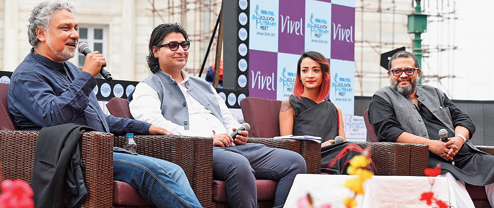
“Our film is as much yours as it is ours.” Team Pink — (right to left) director Aniruddha Roy Chowdhury, actor Andrea Tariang and writer Ritesh Shah — was in conversation with author Kunal Basu on Friday afternoon. Talking about the 2016 she-film, starring Amitabh Bachchan, that became a talking point everywhere, Shah said: “Pink is a propaganda film about consent…. That we could do a film on consent in a way that wasn’t filmi and by taking references from our lives was a huge reason why the film resonated with all of us.” Shillong girl Andrea said it was the script that “resonated with me because most women have experienced what we girls went through in the film”. For Roy Chowdhury, the film was a success because it derived its seeds from reality. “What I read in the newspapers every morning, watched in the news at night and saw all around me — the deep prejudices against women — is what shaped Pink,” said the director about the film creative-produced by Shoojit Sircar.

Three “nasty women” — (from left) actress-activist Ashley Judd, journalist Sagarika Ghose and Apne Aap Women Worldwide president and founder Ruchira Gupta — got together for the day’s last session on Thursday to talk about the hated “f” word, feminism. The session titled Women’s Lives Matter touched on Ruchira’s work with Apne Aap, Ashley’s understanding of feminism, the need to give visibility to beta males and more. And the lady who ruled the stage at the Women’s March on Washington last Saturday, was fiery and bold. “This has been a super rich five minutes, and I might not always be able to do so when I use the expression, but I will always be saying thank you to you for ‘curiosity turns into hostility’,” Ashley told a man who said that much of the behaviour of men, because of lack of access to proper sex education, starts from curiosity and turns into hostility as they grow up.


Jayanta Sengupta and (right) Shazia Omar discussed Two Bengals, One History on Thursday, in conversation with the dean of activities at The Heritage School and a student of history, Priyadarshinee Guha. “Shayista Khan (one of the central characters of Shazia’s Dark Diamond) was a mere footnote in the history of the Maratha leader, Shivaji,” said Sengupta. “When in fact, he ruled Bengal for 22 years,” added Shazia, pre-empting what the curator of Victoria Memorial Hall was about to say. “Don’t accept facts presented to you possibly by Delhi-based or white historians.” Both stressed that history is simply a certain perspective and historical fiction can present a perspective that the text books omit, with imagination fleshing out the gaps in the narrative. “Even if something is fantastical, doesn’t mean it’s unreal. In fact, everything is backed by research. I wanted the women to be less docile as we assume they must have been. But in an era (17th century) when they were allowed no political power, it was not unheard of to procure wealth in other ways,” said Shazia.
Text: Priyanka Roy, Chandreyee Chatterjee & Ramona Sen
Pictures: Rashbehari Das and Pabitra Das











